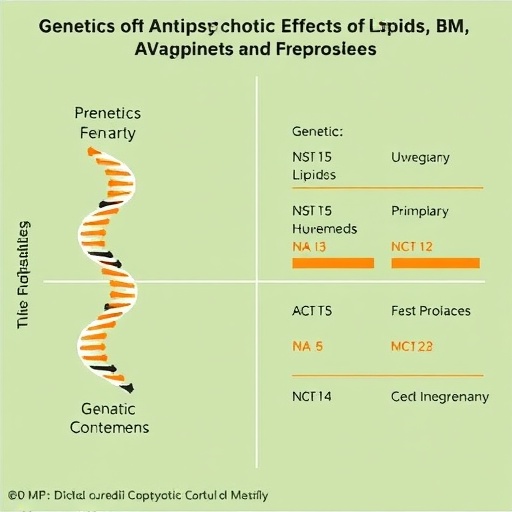In a groundbreaking new study, researchers have uncovered critical insights into the pharmacogenetics underlying antipsychotic-induced metabolic side effects in schizophrenia patients. This extensive genome-wide association study (GWAS), conducted on a cohort of Chinese patients, reveals how genetic variations influence changes in lipid profiles and body mass index (BMI) triggered by antipsychotic medications. These findings could pave the way for more precise, personalized treatment strategies that mitigate the notorious metabolic consequences associated with essential psychiatric medications.
Schizophrenia, a chronic and often debilitating mental disorder, affects millions worldwide and requires long-term use of antipsychotic drugs. While these medications are pivotal in managing psychotic symptoms, they are also infamous for causing significant metabolic disturbances, including weight gain and altered lipid metabolism. Such side effects not only compromise patients’ physical health but also reduce medication adherence, complicating treatment outcomes. Understanding the genetic basis that predisposes individuals to these adverse effects has, until now, remained a significant challenge.
The study meticulously analyzed genome-wide data from hundreds of Chinese schizophrenia patients undergoing antipsychotic therapy. By correlating genetic variants with changes in lipid parameters and BMI, the researchers identified several loci significantly associated with metabolic side effects. This represents one of the first large-scale pharmacogenetic investigations focusing on this specific population, filling a critical gap in ethnically diverse genomic data.
Among the key discoveries were distinct single nucleotide polymorphisms (SNPs) that modulate the degree of weight gain and lipid abnormalities during treatment. These variants appear to influence the body’s responses to antipsychotic drugs at a molecular level, potentially acting through pathways involved in lipid metabolism, insulin signaling, or appetite regulation. The identification of such genetic markers holds promise for predicting which patients are at higher risk of adverse metabolic effects before medication initiation.
Antipsychotic-induced lipid dysregulation, characterized by increased cholesterol and triglyceride levels, was shown to be significantly heritable. This underlines the importance of genetic predisposition, in addition to environmental and lifestyle factors, in shaping the metabolic profile of patients under therapy. The implications are profound; clinicians could eventually tailor antipsychotic regimens not just based on psychiatric symptoms but also considering individual metabolic risk profiles encoded in their DNA.
Furthermore, the study highlights the complex interaction between antipsychotic pharmacodynamics and host genetics. While the precise mechanisms remain to be fully elucidated, several candidate genes identified relate to known metabolic regulators. These include genes involved in hepatic lipid synthesis, adipocyte differentiation, and glucose homeostasis. Such mechanistic insights open new avenues for drug development aimed at reducing metabolic burden while maintaining therapeutic efficacy.
The multi-dimensional approach used in this investigation, combining comprehensive genetic screening with longitudinal clinical monitoring, sets a new standard in psychiatric pharmacogenetics. It emphasizes the necessity of integrating genomics into psychiatric care to confront the dual challenge of mental illness and physical comorbidities. By expanding the genomic resources for non-European populations, this work also addresses a pervasive disparity in precision medicine research.
Another remarkable aspect is the focus on BMI changes, an easily measurable phenotype but one deeply influenced by genetic makeup in the context of antipsychotic treatment. The robust associations found between certain genetic variants and BMI trajectory underscore the potential for early intervention strategies. Patients identified with high-risk genotypes could benefit from proactive lifestyle modifications and pharmacological adjustments, reducing long-term health complications such as type 2 diabetes and cardiovascular disease.
The broader societal impact of these findings cannot be overstated. Schizophrenia patients often face stigmatization and difficulty accessing comprehensive healthcare. By elucidating the biological substrates of treatment side effects, the study advocates for a holistic patient management approach that values not just symptom control but quality of life and metabolic health. This could enhance treatment adherence and overall prognosis.
In clinical practice, these pharmacogenetic insights may soon inform routine screening panels. With advances in affordable genotyping technologies, genetic testing can become a standard part of schizophrenia treatment planning. Such preemptive assessment promises to minimize trial-and-error prescribing and reduce the incidence of debilitating side effects that often lead to treatment discontinuation.
However, challenges remain before translation into clinical guidelines. Larger cohorts and replication studies across diverse populations are necessary to validate and refine genetic predictors. Additionally, functional studies are needed to characterize how specific variants mechanistically contribute to metabolic dysregulation under antipsychotic influence. Interdisciplinary collaborations combining psychiatry, genomics, pharmacology, and metabolic research will be pivotal to advance this emerging field.
The study’s focus on the Chinese population adds invaluable data to the global genetic diversity landscape. Ethnic-specific variants and allele frequencies influence pharmacogenetic profiles; hence, population-tailored findings enhance the precision and applicability of personalized medicine. Future research may explore whether similar genetic architectures exist across other ethnic groups or if unique variants predominate regionally.
Intriguingly, the data also suggest that different antipsychotic drugs may interact variably with genetic markers, leading to heterogeneous metabolic outcomes. This differential effect hints at the possibility of optimizing drug selection not only by symptom efficacy but also by an individual’s genetic susceptibility to adverse metabolic profiles. Such stratified therapeutics could revolutionize schizophrenia care paradigms.
In conclusion, this comprehensive genome-wide study represents a major leap toward integrating genetic information into the management of antipsychotic-induced metabolic side effects. It highlights the crucial role of pharmacogenetics in unraveling the biological complexity of treatment responses in schizophrenia. By enabling prediction and prevention strategies, it offers a beacon of hope for improving both mental and physical health outcomes for millions affected by this challenging disorder.
Subject of Research: Pharmacogenetic investigation of antipsychotic-induced lipid and BMI changes in Chinese schizophrenia patients.
Article Title: Pharmacogenetic study of antipsychotic–induced lipid and BMI changes in Chinese schizophrenia patients: A Genome-Wide Association Study.
Article References:
Wong, K.CY., Leung, P.BM., Lee, B.KW. et al. Pharmacogenetic study of antipsychotic–induced lipid and BMI changes in Chinese schizophrenia patients: A Genome-Wide Association Study. Transl Psychiatry 15, 295 (2025). https://doi.org/10.1038/s41398-025-03499-w
Image Credits: AI Generated




